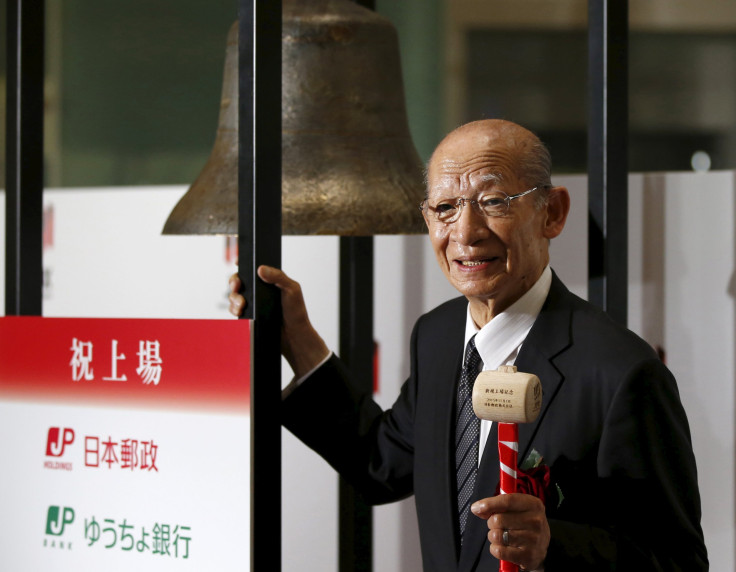Japan Post Companies Climb On Debut After Record-Breaking IPO

UPDATE: 3 a.m. EST -- Japan Post Holdings Co. closed at 1,760 yen at the Tokyo Stock Exchange, a 26 percent jump over its offer price. Its banking unit rose 15 percent while its insurance unit surged 56 percent.
Original story:
Shares of the three Japan Post companies surged after they went public Wednesday following a record-breaking initial public offering that was tied to Japanese Prime Minister Shinzo Abe's plans to revive the country's economy. Japan Post Holding Co. climbed as much as 19 percent from its 1,400-yen IPO price, to 1,665 yen per share, Tokyo Stock Exchange data showed.
Shares of Japan Post Bank Co. and Japan Post Insurance Co. also rose. The government sold 11 percent of each company for 1.4 trillion yen ($12 billion).
Japan Post is one of Japan's biggest and most trusted names, fueling domestic demand, CNBC reported, despite the companies' slow growth prospects. It's the world's biggest IPO for the year, and Japan's biggest in two decades.
Going public was expected to push Japan Post to run the ubiquitous 144-year-old company more efficiently, including developing or selling some of its 24,000 buildings and other real estate assets, the Wall Street Journal reported. This has already started, including a 75-unit condominium project in Chiba, outside Tokyo, that sold out the day it was offered this year, and a new office building in Nagoya that it will launch by year end, the Journal reported.
Abe wants the IPO to turn savers, including savers in the banking unit, into investors, Financial Times reported earlier this week. FT said some fear cost cuts and other changes leading to the closure of many of outposts, which provide services depended on by many, including the country's growing ranks of senior citizens, especially those in the countryside. The banking unit has more outlets than all the country's other banks combined, and the life insurer is the country's biggest. It has 40 percent more outlets than the country's biggest convenience store chain and emplyes 240,000 people, 400,000 if you count part-timers.
Some competitors are wary of such a big and privileged competitor -- aside from its spread it has rights such as free parking and even exemption from one-way rules -- that would now be awash with cash, FT reported. While about a third of the proceeds are earmarked for rehabilitation of areas hit by the 2011 tsunami, the rest hasn't been allocated.
© Copyright IBTimes 2024. All rights reserved.




















